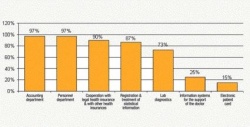Russian resistance to IT
Olga Ostrovskaja reports
The use of IT in Russian medical institutions is still low, partly due to poor funding but also to a lack of understanding among managers of its potential. Most physicians consider treatment is their duty – not IT. They prefer to use special software only for accounting and staffing policy.

A survey of Moscow’s medical institutions by CNews Analytics found that only 15% of out- and in-patient departments have electronic patient records (EPRs), for example, whilst 63% of them wish they could have them. Such ‘dreams’ do not become reality because Russian medical personnel (particularly in state-run clinics) mainly show no interest in IT. Advanced technologies are a kind of exoticism for these medical professionals, most of whom are in leading roles. This is more unfortunate when you know that very big and important medical centres participated in the poll -- the Bakulev Centre, Botkin Hospital, the Filatov, and so on.
The survey has revealed that the medical sector does not have a clear view of IT advantages that could enhance the process of interactions with patients and to actual treatment processes. Although there is worldwide recognition that time lost scribbling reports and waiting for them to return can be improved by conversion to electronic documents circulation, this has not yet been acknowledged by the Russian medical system.
Nevertheless, the survey notes that a psychological barrier to communication with high technologies is common to physicians worldwide, and many European countries faced the same problems several years ago. Russian healthcare received IT ideas a little later. According to other polls, for example, only 30% of Western Europe’s medical personnel were to ready to use software in their treatment process. Russian physicians consider that they have enough IT for them and, at the same time, only about 10% of hospital budget include IT. Even there, the money is mainly spent on supply, office software and payment for the internet. Only about 50% of medical institutions have an IT department.
Interestingly, practically all survey respondents (97%) noted that their institutions use software for accounts and staff administration, and medical managers use IT to communicate with medical insurance companies (90%). Many clinics use software for statistics processing (87%). A large number of people (73%) noted that they prefer to sue IT for laboratory diagnostic. 25% of the physicians use an information retrieval system. 15% of the clinics reported having electronic patient records. (See table)
Attitudes
‘We don’t need anything.’ ‘It’s all the same to us’. ‘We wish we could get every IT solution, but we don’t have money’. About 13% respondents stated that they don’t need any IT at all.
The survey’s last request was ‘… to forecast IT development in hospitals during the financial crisis’. 50% of respondents did not answer, 23% thought that IT development will be greatly reduced, and only 7% were optimistic and believed in IT growth.
International cooperation forces Russian hospitals to take the best experience and develop IT. But they must remember: the software cannot improve bad organisation processing in the institution by itself, but IT can -- and must -- be the mode to enhance hospital efficacy. In addition, IT makes it possible to create clear processing and reduce corrupt practices that are a real problem in the Russian medical system.
17.11.2009





